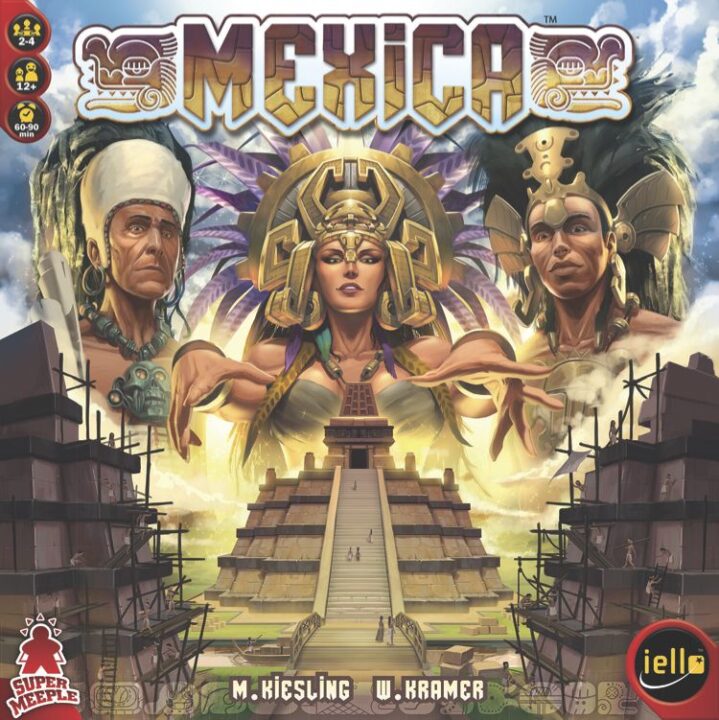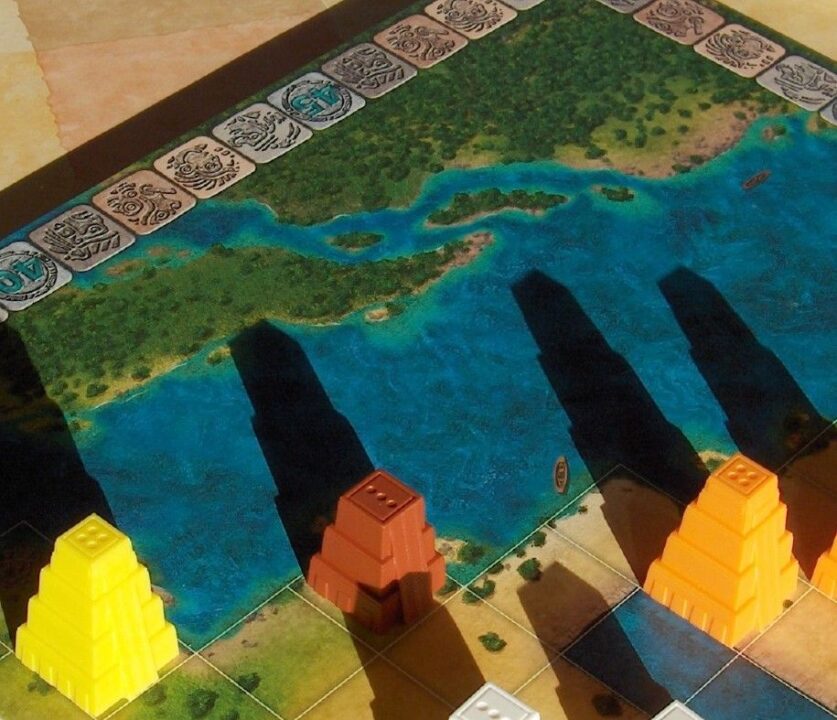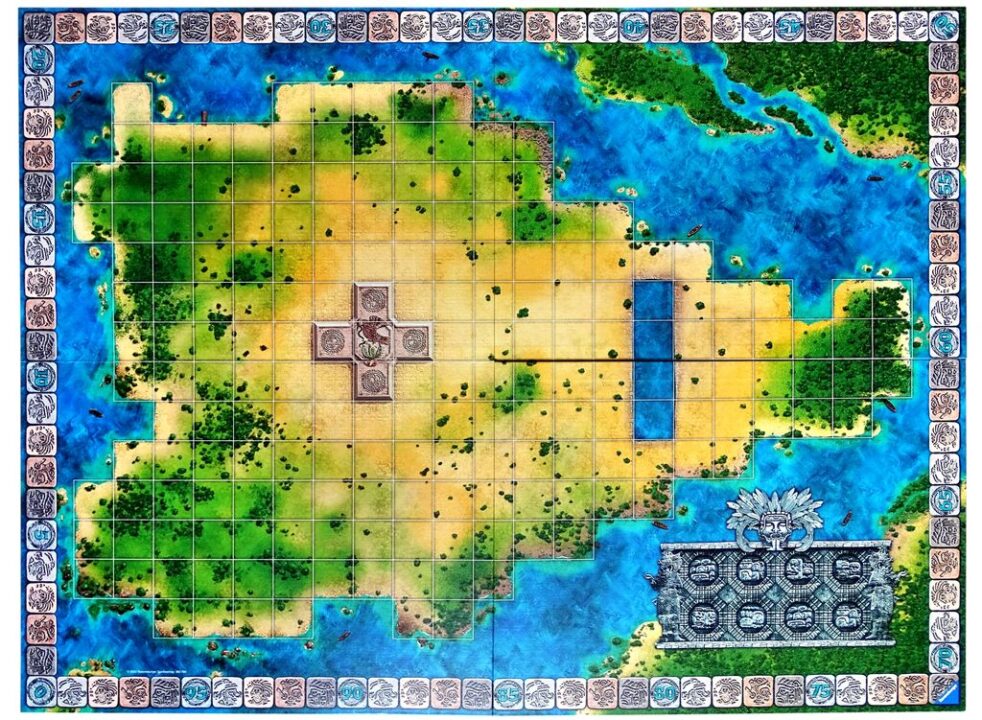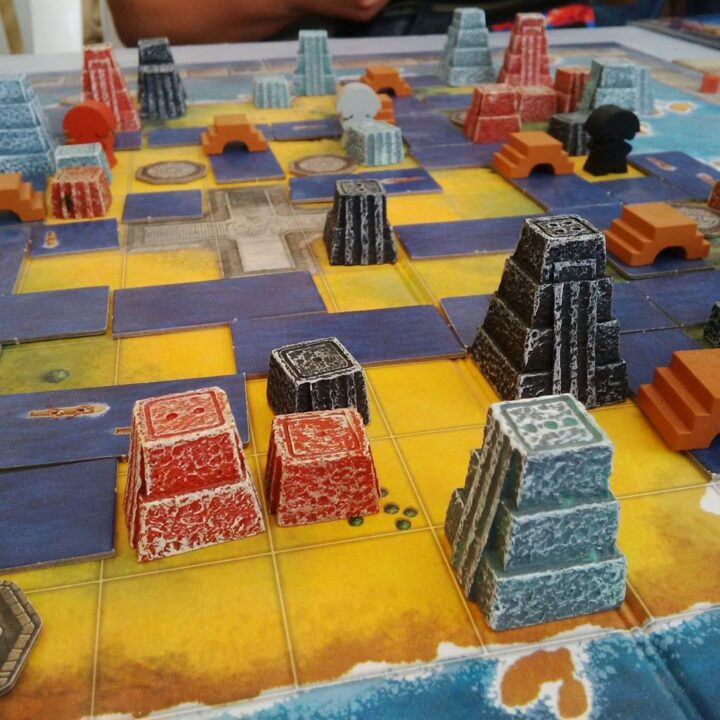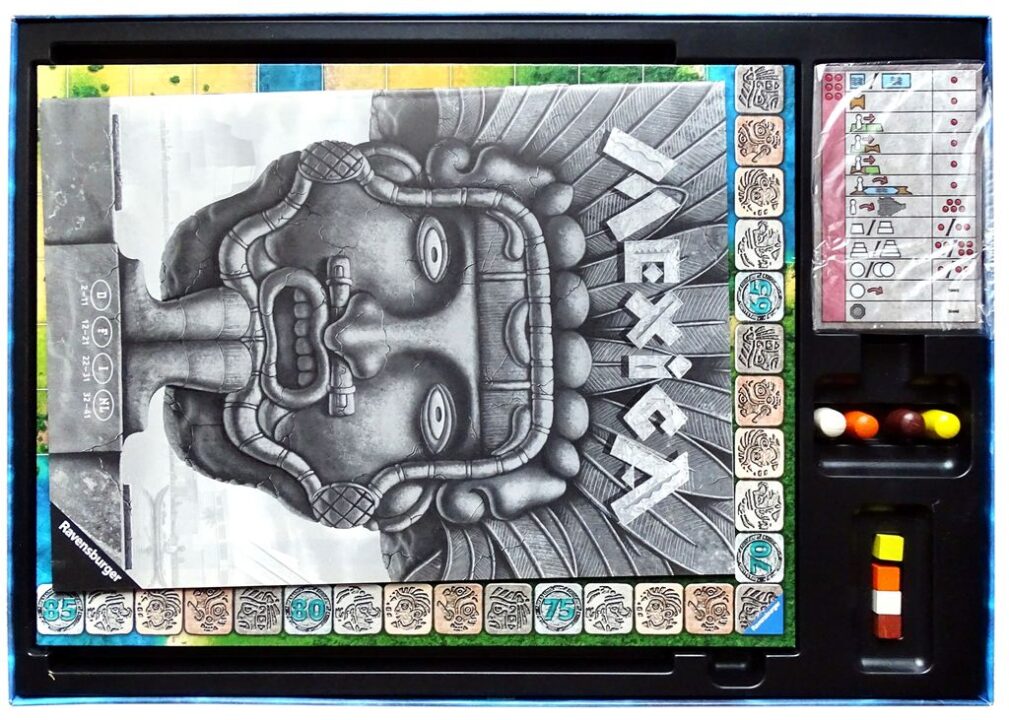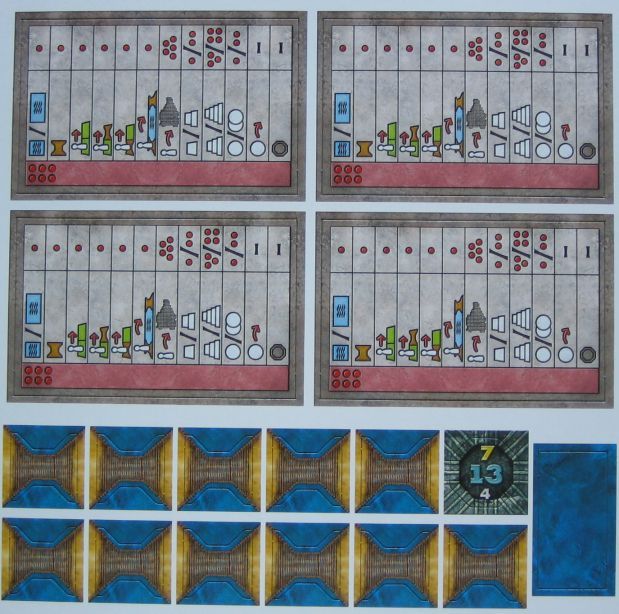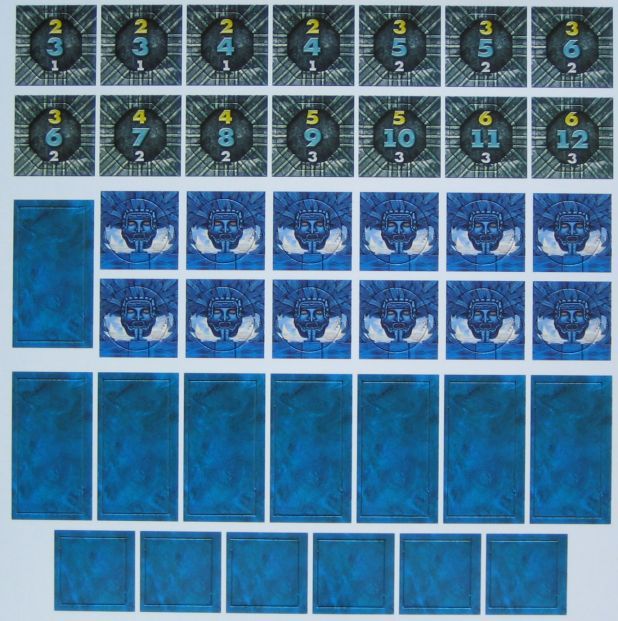Grab your floating palace and hold on to your tokens! You’re in for my review of a game that had my friends plotting, laughing, and occasionally groaning at their own bad planning. If your idea of fun is outsmarting your buddies while building up ancient canals, then keep reading. I played this one until my brain felt like mashed corn, so let me give you the lowdown before you spend your hard-earned taco money.
How It Plays
Setting up
First, slap that gorgeous Mexica board on the table. Hand each player a color set of buildings, canals, and a bridge. Place the scoring markers on the track. Shuffle the district tiles and pull out your pyramid tokens. Everyone grabs some action points, and you’re ready to rule an island.
Gameplay
On your turn, you get 6 action points to spend. You can move your Mexica pawn, plop down canals to split up the island, build bridges, and throw down those shiny pyramid tokens to claim districts. Each action costs points, so plan well! There’s a lot of sneaky canal-building and blocking opponents, but don’t forget to claim and expand your own territory. Keep an eye on the scoring rounds and try to grab the fattest districts for yourself. Trust me, your friends won’t let you have it easy.
Winning the game
After two scoring rounds, count up those victory points. Whoever snagged the best positions in the districts gets the most points. Whoever ends with the most points is crowned the big boss of Mexica. At least until next game night, when your friends demand a rematch.
Want to know more? Read our extensive strategy guide for Mexica.
Gameplay Mechanics and Player Interaction in Mexica
Let me tell you about the heart of Mexica: the gameplay mechanics and the ever-spicy player interaction. If you’ve ever played with someone who thinks they’re the king of all tiles, this game will put them in their place quicker than you can say “Aztec City Building.” Each turn, you get 6 action points. Sounds simple, right? Think again! You can build canals, place bridges, move your little explorer (who I’ve named Pedro every single game), and claim neighborhoods. If you get action point anxiety (I do every game), that’s normal. You’ll want to do everything, but you just can’t. My friend Kelly tried to do it all in one turn and just ended up mumbling about water rights and Aztec bureaucracy.
The twist in Mexica: you aren’t just building. You’re also cutting off your friends, literally and emotionally. When I finally finished my prized neighborhood, Mark swooped in and claimed it with one sneaky move, and I haven’t forgiven him since. You always have to watch what the others are plotting because they will mess with your plans, steal your best spots, and block your precious canal faster than you blink. The interaction is less “table flip” rage and more “sneaky backstab” with a side of passive aggressive bridge building. No one can turtle or ignore other players—the game just won’t allow it.
Speaking of things that stir up feelings at the table, up next, I’ll spill the beans on Mexica’s epic battle between strategy and luck. Spoiler: It’s not just about rolling with the punches.
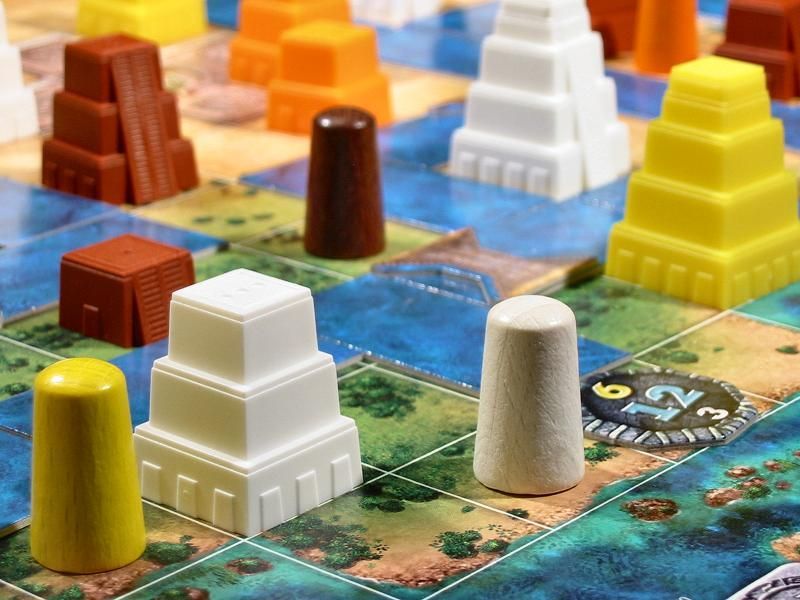
Strategy vs. Luck in Mexica: Who’s Really Calling the Shots?
When it comes to board games, nothing grinds my gears like losing because the dice gods decided to smite me that day. So when my friends suggested we test out Mexica, my skeptical eyebrow went higher than the price of eggs. Luckily (yes, pun intended), Mexica makes you work for your win—no coin flips or wild card draws here to snatch victory from your hands.
Mexica balances its strategy and luck like a waiter in a crowded restaurant. The only real uncertainty comes from player decisions, which can lead to some very colorful language at the table, especially when someone blocks your canal or plops a building right where you were eyeing. There’s no rolling dice, spinning wheels, or drawing surprise cards with wild effects—everything you do is open and planned. Once, my buddy Dave stared at the board for so long, we worried he was having a vision. Turns out, he was plotting a secret strategy three turns in advance. He still lost, but at least it was his own fault.
Now, I won’t say there’s zero luck—sometimes you might wish for someone to make a mistake, like when my friend Amy accidentally helped me win by flooding her own section. But hey, that’s strategy capitalizing on another player’s oopsie, not a twist of fate. Mexica rewards the thinking player, not the lucky one. If you lose, it’s because you got outplayed, not out-lucked. That makes every win as sweet as extra guac on taco night.
Hold onto your sombrero, next up we’re checking if Mexica’s board and bits are as sharp as its game play!
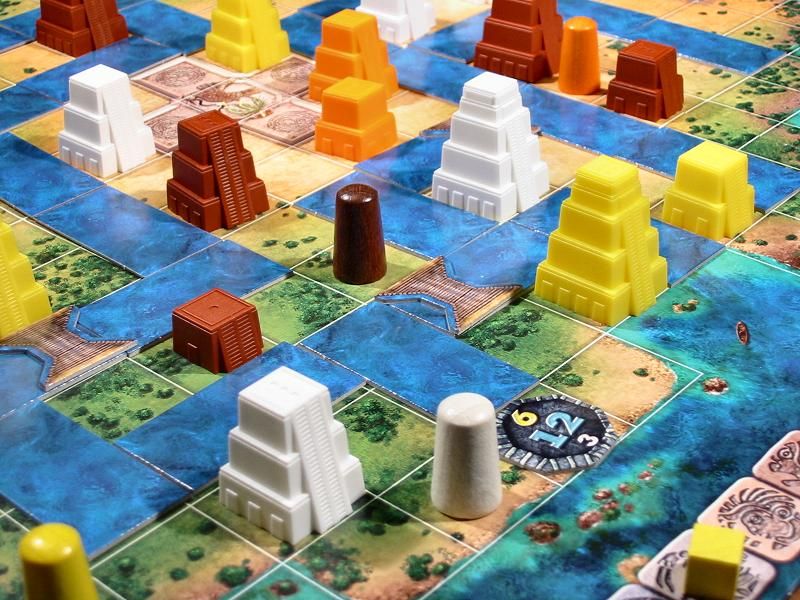
Mexica’s Components and Board: A Treat for the Eyes and Hands
Let me say right off the bat: Mexica doesn’t mess about when it comes to components. This game knows you’re going to spend hours hovering over its lovely board, so it gives you something worth staring at. The board feels downright luxurious, with artwork that has more color than my fridge magnets. It’s a map of an ancient city, divided by canals and causeways, and it gets you in the mood to start plotting districts like a power-hungry urban planner (which, let’s be honest, is exactly what I am when I play Mexica).
The tiles are chunky and satisfying, and believe me, you’ll be laying them down like you’re paving the road to board game victory. My friend Dave tried to stack them up like a pyramid, which is not part of the game, but I admired his commitment. The pieces are sturdy enough to take a bit of abuse, or at least survive a dramatic moment when someone flips the table—cough, Sara. The little bridges you place to cross canals are a brilliant touch and add a fun toy-like element to the otherwise serious city-building business.
I will say, the color choice for some player tokens is a little too close for comfort. If you ever had a fight over which shade of red is yours, you know what I’m talking about. Sometimes we had to squint or play rock-paper-scissors to settle ownership. Still, Mexica’s production is a notch above many games on my shelf.
Alright, but great components don’t count for much if you get bored after one round, right? Next up, I’ll share how Mexica holds up in the long run and whether it shines with two or six players!
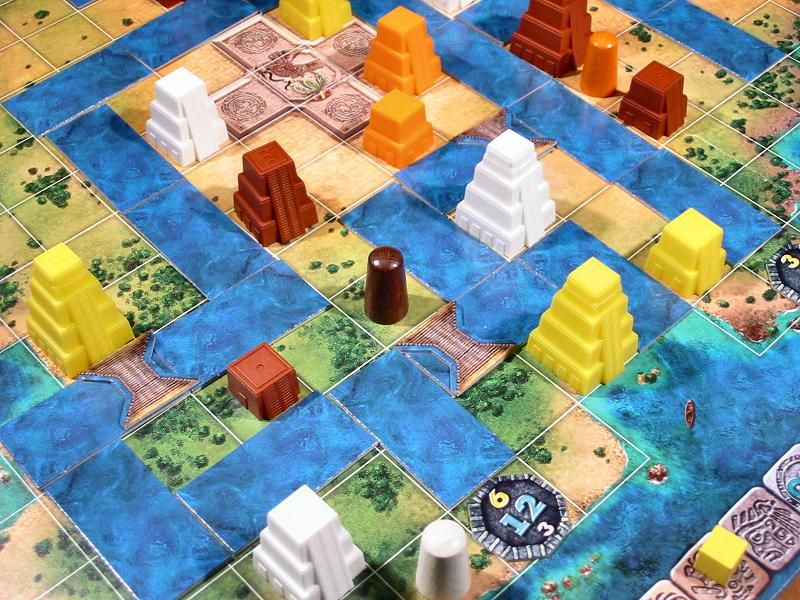
Replay Value and Player Count in Mexica: Will You Get Tired or Addicted?
Let’s talk about replay value in Mexica. Basically, will you keep dragging this game out of your closet, or will it start collecting more dust than my high school trombone? I’ll tell you, after playing Mexica with my friends, I found myself thinking up new ways to split up the city every single time. That’s a good sign. The way the board gets divided into districts means every game plays out a bit differently. You never quite know what sneaky move Sheila across the table has cooking in her brain. (I swear she thinks four moves ahead. My brain can barely handle one and a half.)
Player count is pretty flexible for Mexica. I’ve played with two, three, and four players. With two, it’s a head-to-head tug-of-war, and every action feels almost personal. (If you like tense chess vibes, you’ll love it.) With more players, the map gets snatched up quick and you’ll need eyes in the back of your head. The interaction ramps up and so does the chaos. But I never felt like anyone was kingmaking or ganging up on others. Everything stays pretty fair, which is a huge plus in my book.
One tip: I wouldn’t recommend Mexica for five or six, even if you’re feeling wild. The board can only handle so much crowding, and you end up spending more time waiting than playing.
So, would I recommend Mexica? Yes! If you like smart moves, surprising layouts, and friendly backstabbing, it really shines. Just don’t blame me if you start thinking about city planning in your dreams.
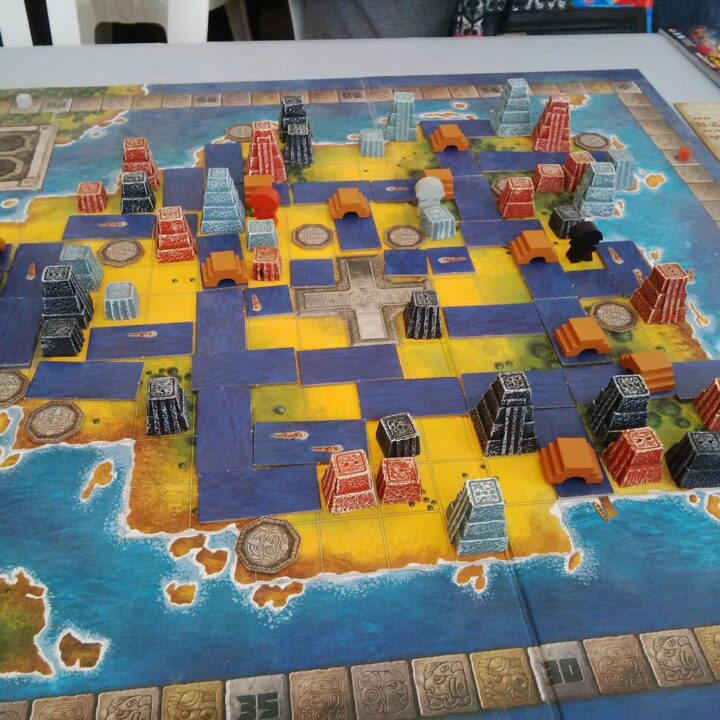
Conclusion
Alright, that’s a wrap on my Mexica review! If you want a game that lets you outsmart your friends without any dice drama, Mexica delivers. The board looks great (even if sometimes the colors made me question if I need new glasses). Every time I played, the turf wars and canal carving got heated but never unfair. Strategy wins, not luck—my type of night! It’s a classy game to play with 2-4 players, and even the guy who always forgets the rules picked it up fast. There’s a lot to love, and not much to moan about, unless you think canals should come with ducks. If you fancy clever area control and like your games to be more brain than blind chance, Mexica should hit your table. Thanks for reading and may your next city be less flooded than mine!

